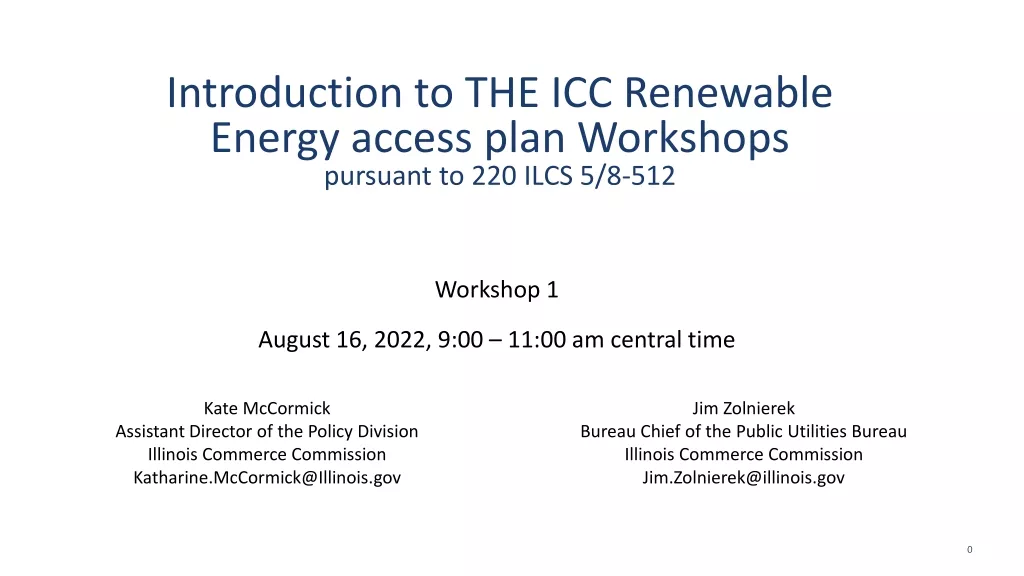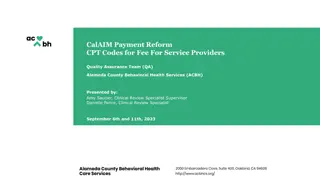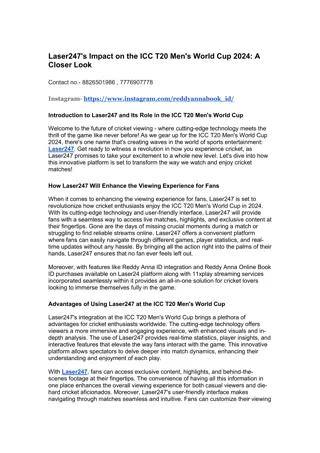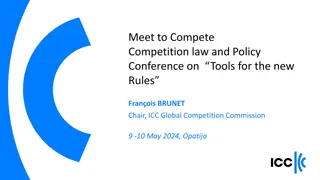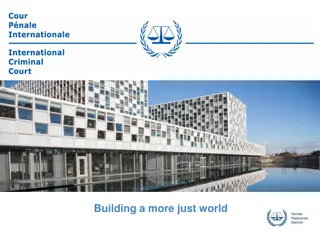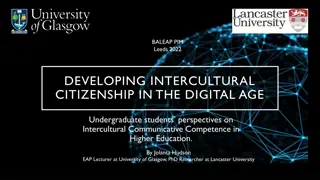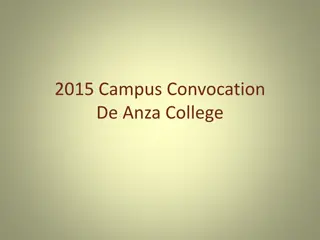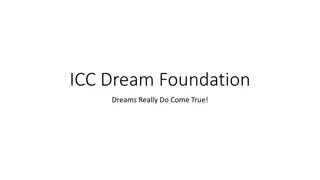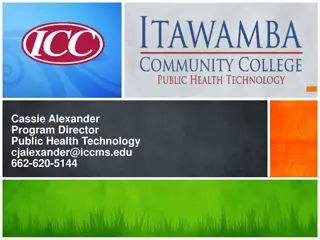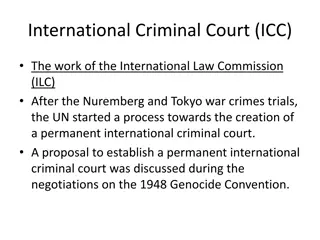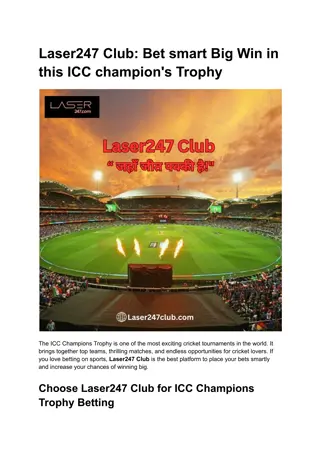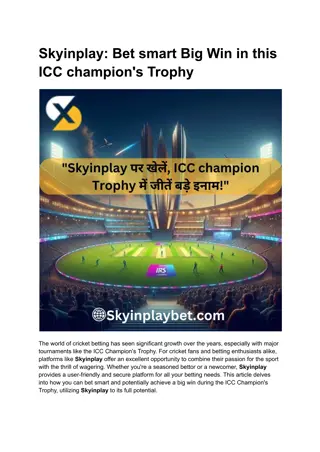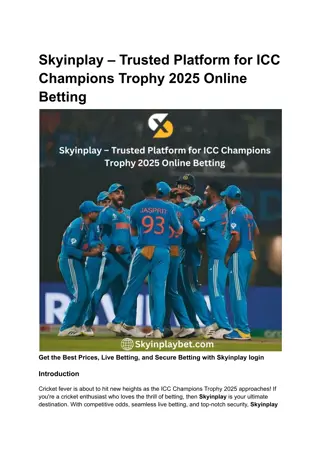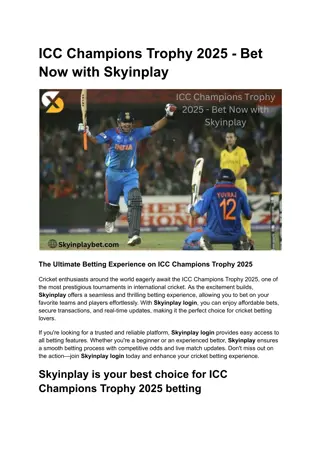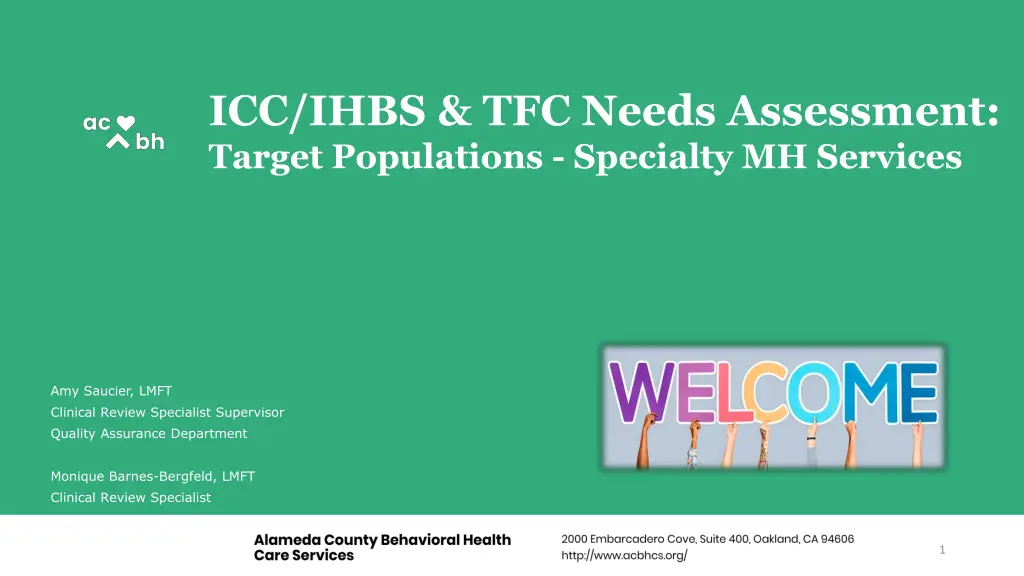
Mental Health Services Needs Assessment for Specialty Populations
Explore the requirements and target populations for Intensive Care Coordination (ICC), Intensive Home-Based Services (IHBS), and Therapeutic Foster Care (TFC) within Specialty Mental Health Services (SMHS). Learn about referral processes and obligations regarding the provision of these services to children and youth under Medi-Cal. Stay updated on the latest Behavioral Health Information Notice and how it impacts service providers and beneficiaries.
Download Presentation

Please find below an Image/Link to download the presentation.
The content on the website is provided AS IS for your information and personal use only. It may not be sold, licensed, or shared on other websites without obtaining consent from the author. If you encounter any issues during the download, it is possible that the publisher has removed the file from their server.
You are allowed to download the files provided on this website for personal or commercial use, subject to the condition that they are used lawfully. All files are the property of their respective owners.
The content on the website is provided AS IS for your information and personal use only. It may not be sold, licensed, or shared on other websites without obtaining consent from the author.
E N D
Presentation Transcript
ICC/IHBS & TFC Needs Assessment: Target Populations - Specialty MH Services Amy Saucier, LMFT Clinical Review Specialist Supervisor Quality Assurance Department Monique Barnes-Bergfeld, LMFT Clinical Review Specialist 1
Learning Objectives Participants will understand the requirements and target populations for Intensive Care Coordination (ICC), Intensive Home-Based Services (IHBS), and Therapeutic Foster Care (TFC) Participants will gain understanding of the criteria for each Specialty Mental Health Services (SMHS) program Participants will obtain information on how to refer clients to these SMHS programs 2
Behavioral Health Information Notice No: 21-058 Purpose is to remind Mental Health Plans (MHPs) of their obligation to continue to provide ICC, IHBS, and TFC to children and youth, as well as the requirements regarding authorization of such services, timely access obligations, and claiming procedures for these services. MHPs are obligated to provide ICC, IHBS, and TFC to all children and youth under the age of 21 eligible for full scope Medi-Cal and who meet medical necessity criteria for these services. 3
Behavioral Health Information Notice No: 21-058 These services are appropriate for children and youth with more intensive needs who are in, or at risk of, placement in residential or hospital settings, but could be effectively served in the home and community. Membership in the Katie A. class or subclass is not a requirement for receiving medically necessary ICC, IHBS, or TFC. Therefore, having an open child welfare services case is not required for a child or youth to receive ICC, IHBS, or TFC. 4
How this impacts you To comply with this requirement, providers must screen all beneficiaries with full- scope Medi-Cal under 21 years old to determine if they qualify for and need any of the following: Intensive Care Coordination (ICC), Intensive Home-Based Services (IHBS), and Therapeutic Foster Care (TFC). ACBH is requesting that providers implement these changes to their assessment process, effective March 7, 2022: Complete individualized screenings of ICC/IHBS/TFC for all Medi-Cal beneficiaries, and document this in the Assessment template. Make necessary updates to your agency s Assessment template and Electronic Health Record. If appropriate, such services should also be included in the child s Client Plan. 5
Why has the ICC/IHBS/TFC screening been included in the assessment? In the DHCS 2020 Triennial Chart Review, ACBH received the following feedback: 1. There was insufficient evidence that all Medi-Cal beneficiaries are being assessed to determine if they need Intensive Care Coordination (ICC) or Intensive Home Based Services (IHBS). 2. Medical records did not contain evidence that beneficiaries received an individualized determination of eligibility and need for ICC services and IHBS, and that if appropriate, such services were included in their Client Plan. 3. Per the Medi-Cal Manual for ICC, IHBS, and TFC for Medi-Cal Beneficiaries, Third Edition, providers must make individualized determinations of each child s/youth s need for ICC, IHBS and TFC, based on the child/youth s strengths and needs. 6
What are ICC, IHBS & TFC services? Intensive Care Coordination (ICC)- ICC is an intensive form of care coordination that identifies ancillary supports and systems to assist with client stabilization. ICC ensures that the client s complex behavioral health needs are met through active, integrated and collaborative participation by provider(s), family, and natural supports. ICCis an intensive form of Targeted Case Management (TCM) that facilitates assessment of, care planning for, and coordination of services for children and youth. ICC includes urgent services for beneficiaries with intensive needs. 7
What are ICC, IHBS & TFC services? While the key service components of ICC are similar to Targeted Case Management (TCM), a difference between ICC and the more traditional TCM is that ICC is intended for children and youth who: - Are involved in multiple child-serving systems; - Have more intensive needs; and/or - Whose treatment requires cross-agency collaboration. - Facilitate a collaborative relationship among the child or youth, his/her family, and involved child-serving systems; ICC services will be assigned by the ACBH ICC Administrator. The ICC provider will reassess every 6 months to a year. IMPORTANT NOTE: ICC is not a prior authorization service and therefore subject to the 10-business day Final Rule-Timeliness standard. A NOABD will need to be issued, if providers are unable to offer clients an ICC appointment within that timeframe. 8
What are ICC, IHBS & TFC services? Intensive Home-Based Services are individualized, strength- based interventions designed to ameliorate mental health conditions that interfere with a child s or youth s functioning. These interventions are aimed at: helping the child/youth build skills for successful functioning in the home and community, as well as improving the family s ability to help the child/youth successfully function in the home and in the community. 9
What are ICC, IHBS & TFC services? The difference between IHBS and more traditional outpatient Specialty Mental Health Services (SMHS) is that IHBS is expected to be of significant intensity to address the mental health needs of the child or youth, consistent with the child s or youth s client plan, and will be predominantly delivered outside an office setting, and in the home, school, or community. IHBS activities support the engagement and participation of the child/youth and their significant support persons. In addition, IHBS activities help the child/youth develop skills and achieve the goals and objectives of the client plan. 10
What are ICC, IHBS & TFC services? Therapeutic Foster Care (TFC)- TFC is a short-term, intensive, highly coordinated, trauma- informed, and individualized intervention available as an EPSDT benefit. TFC should not be the only SMHS that a child or youth receives. Children and youth receiving TFC also must receive ICC and other medically necessary SMHS, as set forth in the client plan. 11
What are ICC, IHBS & TFC services? Similar to ICC and IHBS, there must be a Child and Family Team (CFT) in place to guide and plan TFC service provisions. TFC services are provided by a TFC parent to a child/youth or young adult who has complex emotional and behavioral needs. - The TFC parent serves as a key participant in the therapeutic treatment process of the child or youth; they are trained, intensely supervised, and supported. - The TFC parent will assist the child/youth to achieve client plan goals and objectives; improve functioning and well-being; and help the child/youth remain in a family-like home, in a community setting, thereby avoiding residential, inpatient, or institutional care. 12
Network Adequacy Obligations (see BHIN 21-058 and BHIN 21-023) An appointment must be available within 10 business days of any routine request. If more urgent care is needed, MHPs must make such appointments available within 48-hours. If an ICC appointment cannot be offered within 10 days, a timeliness NOABD must be issued. Once a child has been assessed as being eligible or in need of ICC, IHBS, and TFC, the provider should make a referral as soon as possible to ensure timely access standards are met. Services are meant to support youth with more intensive needs and to stabilize placement in the home/community. Therefore, timely access is critical. 13
Target populations that require screening for ICC/IHBS ICC and IHBS are provided through the EPSDT (Early and Periodic Screening, Diagnosis and Treatment) benefit to all children and youth who meet ALL of the following criteria: Are under the age of 21 Are eligible for the full scope of Medi-Cal services Meet medical necessity criteria for SMHS services A Primary Mental Health clinician is in place and is currently receiving services Is involved with two or more child-serving systems (e.g. Probation, Special Education, Regional Center, etc.) or has multiple mental health providers ICC is needed and cannot be adequately provided under standard mental health case management services 14
Target populations that require screening for ICC/IHBS IHBS is intended to be provided to children and youth living and receiving services in the community. IHBS are mental health rehabilitative services that are available to clients receiving ICC. - Prior to July 1, 2017, IHBS could not be provided in a group home or STRTP. This limitation is no longer in effect. Currently, children and youth under the age of 21, placed in group homes or Short-Term Residential Therapeutic Program (STRTPs), are now eligible for these services, if deemed medically necessary. 15
Target populations that require screening for TFC Services TFC is provided under the EPSDT benefit to all children/youth and young adults who meet ALL of the following: Are under the age of 21 Are eligible for the full scope of Medi-Cal services Meet medical necessity criteria for SMHS Have complex emotional and behavioral needs, who require intensive and frequent mental health support in a family environment. Are at risk of entering a higher level of care, or are stepping down from a higher level of care. A child/youth or young adult who does not have an open child welfare services case, and is not in foster care or involved in the juvenile probation system, may still be considered for TFC. Membership in the Katie A. subclass is not a prerequisite to receiving ICC/IHBS or TFC services. 16
How to document the ICC/IHBS/TFC screening? SMHS Assessment Template - For Clinicians Gateway (CG) users, ACBH is in process of updating the SMHS Assessment template. - In the interim, we recommend that providers document that the child/youth received an individualized screening for ICC, IHBS, and TFC in the Developmental History section of the Assessment. - The Assessment should specify that the child was assessed for ICC, IHBS, and TFC services. - If the child/youth does not qualify for, need, or want services, this should be clearly documented in the Assessment form. 17
How to document the ICC/IHBS/TFC screening? - For providers that do not use CG, ACBH has updated its Medi-Cal compliant Assessment template to include an Intensive Service Needs Assessment for ICC/IHBS/TFC. - Providers may use this form for the purpose of documenting the Assessment, or - Use the language in this template to update your agency s respective MH Assessment form and Electronic Health Record (EHR). - If your agency s EHR does not support integration of the Intensive Service Needs Assessment for ICC, IHBS, and TFC, you may document the individualized determination of need for ICC, IHBS, and TFC in the Developmental History section of the Assessment. 18
ICC/IHBS Referral Process Referral Process for ICC - If the child is eligible and in need of ICC, a referral is required. Complete the appropriate referral form and send to the ACBH ICC Administrator. - ICC services will be assigned by the ACBH ICC Administrator. - The ICC provider will reassess every 6 months to a year. Referral Process for IHBS - Contact the ICC provider listed on the face sheet to recommend IHBS at next Child and Family Team Meeting (CFT) - Referrals for IHBS are typically made by the ICC within the context of a CFT meeting where the family requests additional support for the client in the home and community. - Once submitted, services are authorized by ACBH. 19
TFC Referral Process Youth are typically referred to TFC services through Child Welfare or Probation departments as an out-of-home placement option. Recommendations for this level of service are processed through the CFT and placement is facilitated by the appropriate placing agency. Contact the Child and Family Team facilitator (from ICC, Child Welfare, or Probation) to make the recommendation. 20
TFC Referral Process For youth placed by Child Welfare or Probation: The Child and Family Team (CFT) makes a recommendation for TFC Services. The placing agency completes a referral and submits it to the Interagency Placement Review Committee (IPRC). If approved by the IPRC, the client s outpatient mental health provider will update the client s assessment and treatment plan to include TFC as a modality. If a client is not already connected to outpatient MH services, the contracted TFC provider, Alternative Family Services (AFS), will complete the assessment and treatment plan. 21
TFC Referral Process For youth placed by Child Welfare or Probation: The referral, assessment, and plan will be sent to Utilization Management (UM) for authorization. If authorized, AFS will develop a TFC specific client plan or collaborate with the outpatient clinician to redevelop the treatment plan to reflect the client s specific TFC needs. The client can be placed with a TFC parent for TFC services. 22
TFC Referral Process For youth who are not Child Welfare or Probation-involved: The client s outpatient MH clinician and CFT recommend TFC services. (If the client is not already receiving ICC, a referral is made to the ACBH ICC Administrator to initiate ICC services. Once a CFT is established, the CFT may recommend TFC services.) The client s outpatient MH clinician updates the assessment and treatment plan to contain TFC as a modality and sends referral to the IPRC. The referral, assessment, and plan will be sent to UM for authorization. If authorized, AFS will develop a TFC specific client plan or collaborate with the outpatient clinician to redevelop the treatment plan to reflect the client s specific TFC needs. The client can be placed with a TFC parent for TFC services. 23
Additional Information: Care Plans for ICC Services Under the California Advancing and Innovating Medi-Cal (CalAIM) initiative, behavioral health Documentation Redesign is scheduled to go-live in July 2022. As part of this initiative, DHCS is proposing documentation changes that will impact treatment plans. It is important to note that federal law requires a care plan for individuals receiving case management services (42 C.F.R. 440.169(d)(2)). As a result, an individual plan of care will still be required for Targeted Case Management services, including Intensive Care Coordination. ACBH will provide additional guidance regarding Documentation Redesign as information becomes available. Reference: Behavioral Health Information Notice (BHIN) No: 21-073. 24
Additional Referral Information Referral forms for ICC and IHBS in English in Spanish are available here: Child & Youth Services (0 24 Years) Alameda County Behavioral Health (acbhcs.org) For questions about clinical documentation, please contact QATA@acgov.org. 25

